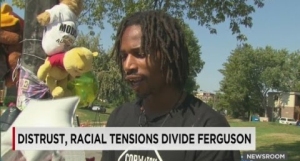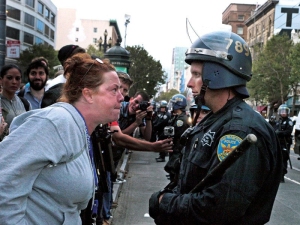I’ve had little exposure to police, prisons, judges and the court system beyond being on jury duty. That is, until the moment, some time ago, when I was accused of a serious crime, one I didn’t commit.
I experienced first hand what it’s like to be interrogated by police who were totally and thoroughly convinced of my guilt. Everything I said, everything I had done that auspicious day, was interpreted in a negative, incriminating way. I felt totally helpless. And this was in an interrogation room, when cool heads could have prevailed. I can only imagine the pure futility of encountering that attitude on the street, in the heat of the moment, with emotions running amok.
I believe the only reason I got off without being charged was because of being white, living in suburbia and having no prior record. Afterwards, however, I knew in a deep, indisputable way that there had to be innocent people incarcerated. My suspicions were easily confirmed.

Of course many of the incarcerated are not innocent. Most are guilty, and some may need to be sequestered away from society for a time. Still I have a very strong attachment to criminal justice reform.
In my own life, a mindfulness practice has been invaluable. Nonetheless I ponder the place of a mindfulness practice in the wider world, in particular within the criminal justice system.
What does it take to really listen across boundaries of race, class or political views? What does it take to truly put aside thoughts of evil intent and move away from an “us” versus “them” approach? For me? For police?
Police officers need to make split second decisions in often ambiguous situations. Would they ever be open to learning new tools? I was pleasantly surprised to find the degree to which police officers, corrections officers, lawyers, judges and others on the front lines in many locations are having positive results from mindfulness training.
The following is from an article titled: How Mindfulness is Changing Law Enforcement by Jill Suttie:
Chief of police, Sylvia Moir, says, “The science is validating that mindfulness has the potential to increase fair and impartial policing, because we are open to recognizing our responses to a stimulus, to an event, to a person. I really think this is going to change the way we show up for our communities. “
Obviously it will be a long, slow process for mindfulness to have a major impact on the criminal justice system. However, I find hope and inspiration from seeing the ways in which many, many people are using a mindfulness practice not just for personal growth or for adapting to an existing system, but for actually changing how we respond to others in significant ways. It is in that process that I find hope for real change in our larger society.
Further information on mindfulness in the criminal justice system:
A conference on Mindful Justice took place in September 2015 that “brought together the pioneers of mindfulness-based programming in the criminal justice system, as well as teachers, researchers, and policy-makers with an interest in this work, to explore how we can establish a shared vision for system-wide transformation drawing on the principles and practices of mindfulness…This moment is a particularly ripe one for catalyzing fundamental change in the American criminal justice system.”
The following is a link to a paper from the conference that provides details about the breadth of mindfulness programs within the criminal justice system.
Mindfulness and Criminal Justice: The State of the Field by Dan Carlin
Information, videos and papers from that conference can also be found at www.mindfuljustice.org
More information about mindfulness and the justice system in papers from the conference:
Santa Clara County Justice System

